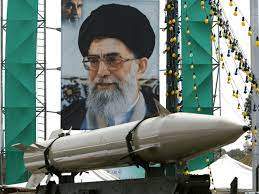Iran: We’re Not Talking to Biden Unless U.S. Lifts All Sanctions, Not Just Nuclear Ones

Officials in Iran once again debunked claims by the U.S. State Department and friendly media that the Biden Administration is in “indirect” talks with Tehran on Wednesday, stating the Islamic regime has nothing to discuss without an end to every American sanction on the rogue state.
State Department spokesman Ned Price confirmed Monday that President Joe Biden approved travel for his top Iran envoy, Robert Malley, to Vienna, Austria, where the remaining signatories to the 2015 Iran nuclear deal would be meeting this week. While Price claimed Malley would be in town for “indirect” talks with the partners in the Joint Comprehensive Plan of Action (JCPOA), Iranian officials quickly dismissed this claim, asserting that “no representative from the United States will attend the Joint Commission meeting or related expert meetings and no direct and indirect negotiations with the United States are on the agenda of Iran’s delegation.”
Iranian officials Wednesday again repeated their clarification that they are not in discussions with any representatives of the Biden administration and that they will only address the Americans if the United States repeals all existing sanctions on Iran. Iran is currently classified as a State Sponsor of Terrorism, which imposes one of the most stringent lists of sanctions available to American diplomats. The classification is not connected to any sanctions imposed under President Donald Trump for violations of the nuclear deal or other sanctions related to human rights abuses against the Iranian people, but Tehran insists they all be repealed together.
“From Iran’s viewpoint, all American sanctions — including the Obama-era sanctions, the sanctions restored by Trump and the additional sanctions in the Trump-era labeled as non-nuclear — must be terminated,” an unnamed “senior” Iranian official told PressTV, an Iranian state media outlet. “Iran’s condition for returning to its JCPOA commitments is the lasting removal of all the entire sanctions.”
Malley, the Biden envoy, is staying in a separate hotel from where the JCPOA meeting is occurring and reportedly has no contact with Iranian diplomats, yet pro-Biden American news outlets have claimed a diplomatic breakthrough is underway in Vienna. The countries actually invited to the meeting — Russia, China, Germany, France, the UK, and Iran — concluded their talks on Tuesday and will not meet again until Friday. They reportedly agreed “to establish two expert-level working groups, one to work on the lifting of sanctions and the other to work on nuclear issues,” according to Iran’s PressTV.
“Iran and U.S. Agree on Path Back to Nuclear Deal,” the New York Times claimed in a headline Wednesday. A CNN analysis applauded that Biden would “spiritually” be involved in the meeting.
“The talks are an important goal for Biden, who was vice president when President Barack Obama struck the original deal and who has surrounded himself with advisers who took part in the lengthy negotiations,” the Washington Post observed, after having admitted that no “talks” between Tehran and Washington are actually occurring.
An opinion piece at NBC News by an expert who admits in the piece to sharing dinner with Iranian President Hassan Rouhani celebrated that the talks, involving no American representatives and resulting in no concrete results, allowed “Biden to fix Trump’s mess.” Trump withdrew from the JCPOA in 2018 due to Iran’s consistent violations of the provisions of the agreement.
“The Vienna talks may be our last chance to restore the deal. The clock is ticking,” the column breathlessly predicts, without clarifying that the United States was not invited and is not participating in the talks.
PressTV and other Iranian outlets such as Mehr, Fars, and Tasnim have, in contrast, portrayed the Vienna talks as a matter between Iran and JCPOA signatories like China and Russia, not America. PressTV highlighted the Chinese envoy’s aggressive demands that Washington lift all sanctions at the meeting.
“The justified request of the injured party, rather than the offending party, should be confirmed and satisfied first. This is a basic right-or-wrong question. The US should lift all sanctions against Tehran and on this basis, Iran can resume full compliance to the nuclear deal,” Wang Qun, China’s envoy in Vienna, told reporters Tuesday, according to PressTV.
Russia, one of Iran’s closest international allies, expressed reservations on calling the Vienna talks a success, rather than focusing on pressuring Washington.
“It is too early to talk about a major breakthrough,” Russian representative at the meeting Mikhail Ulyanov said Tuesday, according to the Russian news agency Tass, noting that there are about 1,500 individual sanctions currently on the Iranian regime, all of which Tehran wants removed.
Price, the State Department spokesman, described Tuesday’s talks as “constructive” and “welcome,” with little emphasis on America’s absence there.
“It is a potentially useful step as we seek to determine what it is that the Iranians are prepared to do to return to compliance with the stringent limitations under the 2015 deal and, as a result, what we might need to do to return to compliance ourselves,” Price suggested.
Talks are scheduled to resume Friday, also without the Biden administration present.
Photo: ATTA KENARE/AFP/Getty Images
Link: https://www.breitbart.com/middle-east/2021/04/07/iran-were-not-talking-biden-unless-u-s-lifts-all-sanctions-not-just-nuclear-ones/




